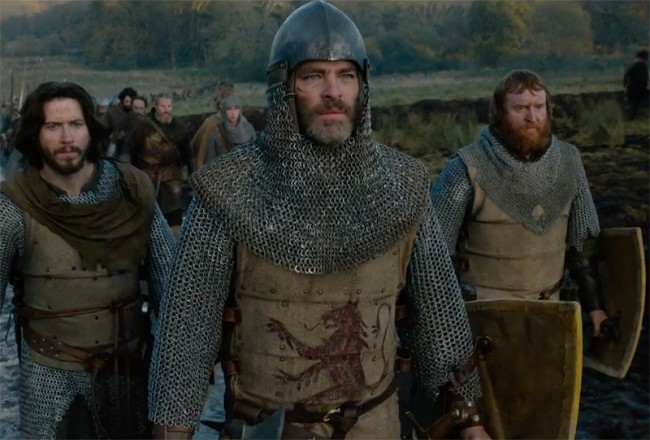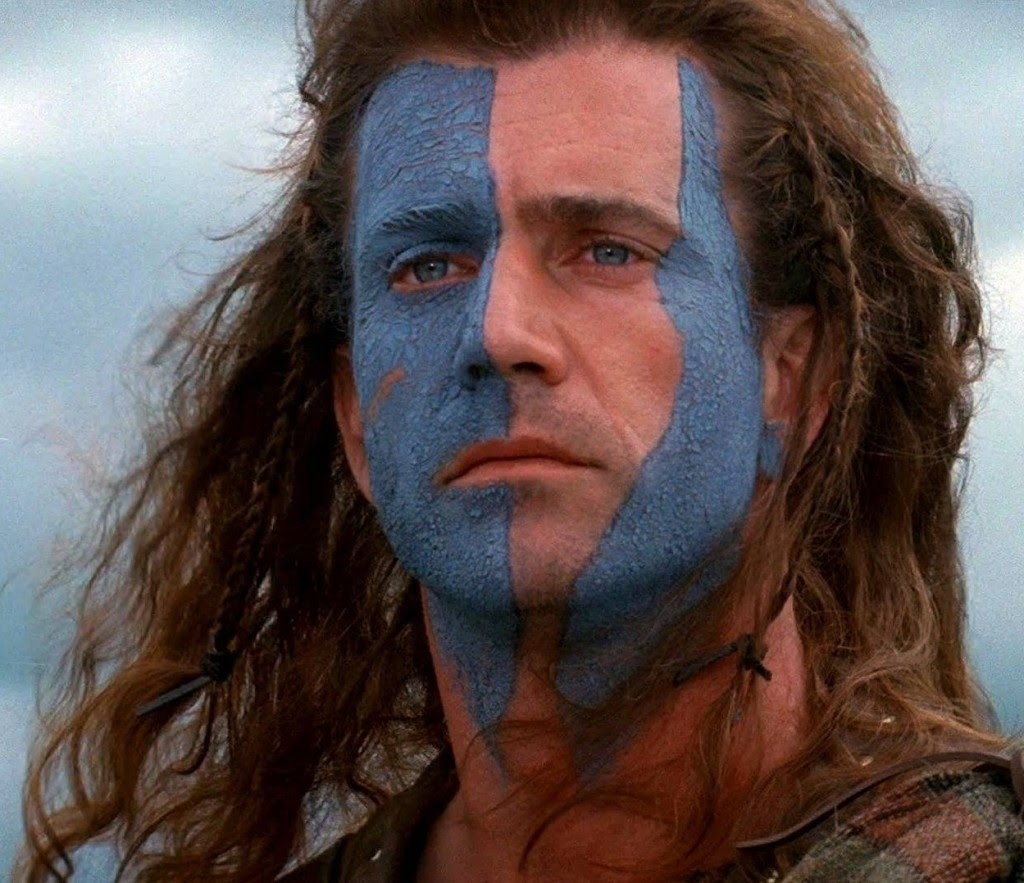Today’s Braveheart sequel review comes with a trio of must-know screenwriting lessons.
Genre: Period/Action
Premise: In the 14th Century, Scottish King, Robert The Bruce, attempts to free his country from England once and for all.
About: This film has been making noise for numerous reasons. First, it positioned itself as an obvious spiritual sequel to Mel Gibson’s Braveheart. For those who don’t remember, Robert the Bruce was the troubled Scottish noble in that movie who waffled back and forth between supporting and undermining William Wallace. Outlaw King was directed by David Mackenzie, whose only other well-known movie was 2016’s Hell or High Water. This would explain how Mackenzie was able to get fast-rising star Chris Pine to play Robert the Bruce. The film received a 120 million dollar budget from Netflix, where it debuted this weekend.
Writer: Bathsheba Doran & David Mackenzie & James MacInnes (additional writing by David Harrower & Mark Bomack)
Details: 120 minutes
While it pains me to say it, Outlaw King is not a good movie. However, I’m ecstatic that I saw it. I don’t think there is a better screenwriting lesson out there than watching Outlaw King and Braveheart back to back. Each creator tells what is, essentially, the same story, with one succeeding and the other failing. This allows you to directly compare why Braveheart succeeds and Outlaw King does not. It’s a fascinating exercise.
If you didn’t have time to check Outlaw King out, it introduces us to Robert the Bruce during his surrender, along with the rest of the nobles, to King Edward of England. Afterwards, Robert heads back to Scotland, where he marries the goddaughter of Edward, Elizabeth. Since Robert lost his previous wife to childbirth, he’s not keen on falling in love again, and refuses to consummate the marriage.
A couple of years later, Robert is shaken when the English celebrate wildly at the capture, torture, and killing of William Wallace. He decides he doesn’t want to play by the English’s rules anymore (or pay their taxes), and constructs a plan to gain independence. This requires persuading a high-ranking Lord of Scotland to join him. And when this Lord doesn’t agree, Robert kills him, allowing him to don the sole crown of Scotland. Robert is now their king.
Robert comes around on the marriage thing, falling in love with his wife, who helps him plot his attack. Robert must round up the rest of the Scots (who are divided into clans) and convince them to help. Some of them do but most don’t. Later, Elizabeth is kidnapped by the English, adding an immediacy to the whole ordeal. Robert arrives at the hill where the big battle with the English will take place, only to realize he’s vastly outnumbered. He inspires his men to fight anyway, where he leads an impossible victory, finally gaining freedom for his country.
Okay, where do I begin?
There are three primary reasons why Braveheart is leaps and bounds better than Outlaw King. The first is that William Wallace is the most active hero in cinema history. Any screenwriting class you go to will promote the importance of an active hero. This is because when your hero really wants something, he’s always going to be moving. He’s always going to be charging forward. This is when movies work best, when the narrative is charging along, full steam ahead.
William Wallace wants freedom. He says it over a dozen times in Braveheart. And he’s willing to do anything to get that freedom. If you watch Braveheart, you’ll notice that the only time we’re not charging forward to the next battle, or in the battle itself, is to set up when the next battle is coming. William Wallace MUST obtain freedom, and will fight as many battles as he can to do so.
Robert the Bruce, meanwhile, is a more reserved character. He wants freedom, but he doesn’t want it at all costs. And the narrative reflects this. We’re moving forward towards a goal – freedom – but we do so at a measured pace, reflective of the man trying to achieve it. I’m not saying that movies don’t work with reserved heroes. I’m only saying that it’s a lot easier to make active heroes work, due to the way they turbo-charge a narrative. This is even more important for long period-piece movies, which have a propensity to get stuck in the mud. Screenwriter Randall Wallace and Mel Gibson knew this. I’m not sure Mackenzie does.
The second reason is that Randall Wallace and Gibson gave William Wallace personality. Wallace could be angry at times, tender (to his wife), insane (when he’s revving up his army), funny, outspoken. He was a very expressive character, which makes him pop off the screen more. Meanwhile, Robert the Bruce doesn’t talk much. He’s someone who speaks through his eyes. He’s reserved most of the time. And these characters are very difficult to make work. You’re basically hoping that the actor can create an amazing character through their eyes alone. And Pine doesn’t pull it off. He’s okay. But outside of a single moment where he surprisingly kills a rival, he’s kinda boring. This is why I always tell screenwriters writing these quiet reserved heroes to think twice about it. All you need to do is watch William Wallace compared to Robert the Bruce to see why.
But the biggest lesson I learned from comparing these two movies is how important good scene writing is. Bravehart has, literally, a dozen great scenes. Most movies have three great scenes, if they’re lucky. But what’s awesome about Braveheart is that each scene or sequence of scenes, is like a mini-movie. There’s very little patchwork writing here, where you include a scene just to get a character from point A to point B. Instead, most of the scenes have a setup, a conflict, and a resolution.
A marriage scene starts off with everyone happy and dancing. Then the English show up. They take the bride as a part of their new ‘First Rites’ amendment, whereby the English get to have sex with all newly married Scottish brides. Or when the English try to rape Wallace’s wife, then Wallace beats them off of her, sets her off to meet him at a rendezvous in the forest, but she’s instead captured, and has her throat slit. Or the following scene, where Wallace arrives slowly on his horse, surrendering, before surprisingly attacking the English, inspiring an uprising, and murdering the man who killed his wife.
Scene after scene is like that. Beginning, middle, end. Beginning, middle, end.
With Outlaw King, there is virtually none of that. Most of the scenes are fragments. For example, the scene I mentioned above, where the Scottish are having a post-wedding party, only to watch the English arrive and take the bride. Outlaw King gives us the party part, but doesn’t introduce the conflict that turns the scene into a memorable one. They show the celebration and that’s it. This occurs throughout the film, where we’re only getting these fragments of scenes which never build to anything. It’s a big reason why the film feels so unsatisfying.
Finally, the script struggles to orient us throughout the story. We know that Robert the Bruce is trying to obtain freedom, but we’re not always sure how he’s going about it. I remember in Braveheart that each time they conquered a leg of the goal, they would have a scene where they’d clearly lay out what the next objective was. This ensured that we were always in the loop about what William Wallace was doing and why. Here, the journey is less linear, and therefore harder to follow. This required more explanation from the writers, which they didn’t provide.
There was one scene, in particular, where Robert and his army were on a river, and they’re all of a sudden attacked by someone. These people seemed more ragtag than the English army, so I assumed they were someone else. But even now, I still don’t know who they were. Questions like that would pop up regularly. This is why I tell writers that if you’re going to write a period piece or any movie with an extensive mythology, you have to be extra clear about what’s going on. Because while you clearly know who this ragtag river army is, we don’t, unless you tell us.
I wish I could recommend this on its own. Unfortunately, I can only recommend it to screenwriters keen on learning a few major lessons. Catch it back to back with Braveheart and watch your screenwriting IQ soar.
[ ] What the hell did I just watch?
[x] wasn’t for me
[ ] worth the stream
[ ] impressive
[ ] genius
What I learned: Beginning, middle, and end to your scenes. Set up a scenario, throw in some conflict, have your characters try and resolve it, they either succeed or fail.



